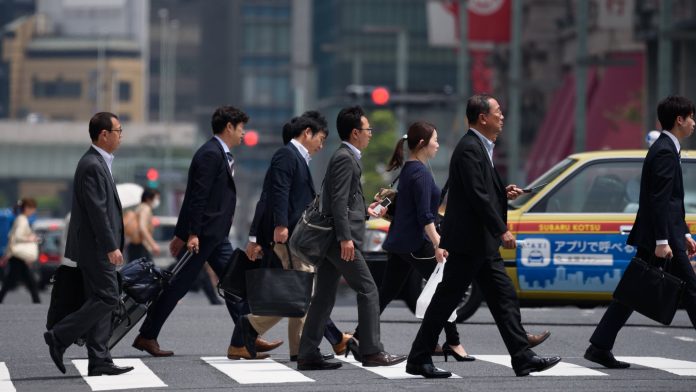Japanese workers’ base salaries rose the most since 1993, a jump that supports the case for the Bank of Japan (BoJ) to consider raising interest rates even as real wages continue to fall. Base pay increased 2.5% in May from a year ago, the fastest growth since 1993, outpacing the 1.9% gain in the headline figure, the Labour Ministry reported yesterday.
A more stable measure for full-time workers that avoids sampling issues and excludes bonuses and overtime pay rose by a record 2.7%, a firmer indication of improvement in the overall wage trend. The data come after the nation’s biggest umbrella group for unions said it secured an average wage increase of 5.1% for its workers this year, the biggest gain since 1991.
Yesterday’s figures may bolster confidence in the view that a virtuous cycle is emerging of wage and consumption growth that generates demand-led inflation. That’s a dynamic that would support moves by the BoJ to further normalise policy including the possibility of raising rates as soon as this month after it hiked in March for the first time in 17 years. The yen was largely unmoved after the report, an indication that investors didn’t see the array of figures as a game-changer for the central bank.
One in three economists surveyed by Bloomberg last month sees the bank hiking rates at its board meeting concluding on July 31, when authorities are also set to unveil plans to reduce bond purchases and update their economic outlook. So far the evidence on pay increases boosting consumption is mixed. A gauge of household spending released last week showed that expenditures unexpectedly fell in May by 1.8% versus the same period a year earlier. Other figures showed that retail sales growth picked up to a pace that beat consensus estimates that same month.
Inflation continues to pressure household budgets. Yesterday’s figures showed that real cash earnings fell 1.4%, sliding for a 26th consecutive month. The country’s key price indicator rose 2.6% in May, remaining at or above the BoJ’s 2% target for over two years. Persistent weakness in the yen has heightened fears that cost-push inflation may further squeeze consumers. The headline cash earnings figure for May came in weaker than a forecast 2.1%, though the report showed the result was dragged down by falling bonus payments. Bonuses and overtime pay mask the overall trend.
Finance Minister Shunichi Suzuki said last Friday that inflation remains a concern despite the significant pay increases of late, adding that recent price increases have partly been driven by higher energy prices and the weak currency. Still, the uptick in base pay supports the case for some optimism. Many households received one-off tax rebates in June, and there may be more upside for pay trends.
According to Morgan Stanley, wage increases take time to show up in pay packets. In 2023, fewer than half the firms that pledged wage gains in spring negotiations administered those increases by May, the bank said. Tightness in the labour market is expected to help maintain upward pressure on wages. The BoJ’s latest Tankan survey showed that businesses are increasingly facing labour shortages, particularly among non-manufacturers, which experienced the worst manpower constraints in more than 30 years. The BoJ has said it expects private consumption to recover after four quarters of declines, potentially underpinning an economic recovery. Prime Minister Fumio Kishida is also looking for signs of resilient spending as he hopes to restore his support ahead of a party leadership contest in September as well as a potential general election. To mitigate the impact of inflation on households, the premier said last month he would reintroduce utility subsidies starting in August.
— Bloomberg




















